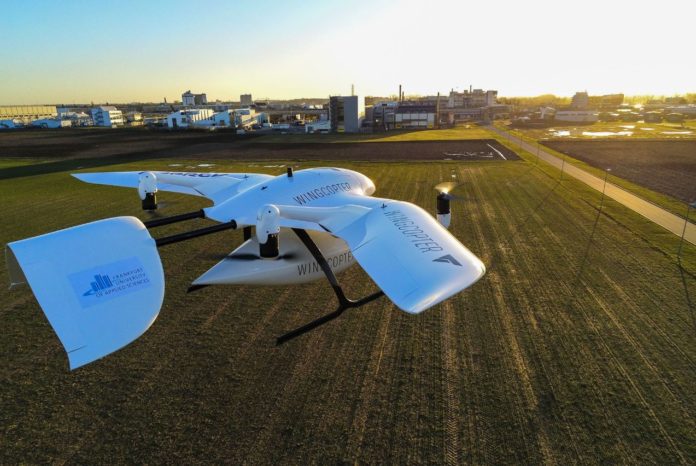Today Wingcopter, the developer of autonomous delivery drones for humanitarian and commercial applications, has been named one of nine winners of the #SmartDevelopmentHack. Through this global hackathon, the German Ministry for Economic Cooperation and Development (BMZ) solicited innovative digital solutions to tackle the challenges caused by the coronavirus outbreak in low- and middle-income countries. The lineup of supporters included the European Commission (through EuropeAid), GIZ, the Bill & Melinda Gates Foundation, Smart Africa, Technical University Munich, Oracle, SAP, and others. Each winning team will be awarded up to €3 million to implement their projects in-country.
We’ve had our eye on Wingcopter for a while now, and are excited to have them speak at the EU-Startups Summit in 2021, as well as having included them in our list of 10 German startups that will crush it in 2020 and beyond – despite Coronavirus. Founded in 2017, they are known speeding up life-saving medicine delivery for remote islands – true to the company’s guiding principle “Technology with a Purpose”. With its patented tilt-rotor mechanism the startup closes the gap between commercial drones, helicopters and fixed-wing aircraft, thus achieving a new dimension of efficiency.
After two intense days of hacking, Wingcopter, alongside its partners UNICEF and the African Drone and Data Academy (ADDA), came up with the concept to use Wingcopter drones to improve health supply chains during COVID-19 and to open up new long-term opportunities for youth in Africa. Thanks to a great collaboration, the funds awarded for the project will be split between Wingcopter and UNICEF/ADDA.
In more detail, the 18-month project will involve setting up a locally operated delivery drone network in Malawi, giving on-demand access to medical supplies such as COVID-19 test kits or vaccines (once available). At the same time, they will also build local capacity with two distinct training programmes for 160 Malawian youth. The locals taking part will get access to a virtual education platform, and selected students will be provided with the applicable technical equipment and pre-installed software (internet-free) to help them learn to assemble, operate, and maintain Wingcopter drones. Alongside the data analytics skills provided by ADDA, the Malawian students will be equipped with the tools to pursue new entrepreneurial or job opportunities, granting them new economic perspectives.
After proving the concept’s viability and successful implementation in Malawi, Wingcopter and UNICEF plan to adapt the concept and scale to Rwanda.
Tom Plümmer, co-founder and CEO of Wingcopter, commented: “Wingcopter’s long-term strategy involves developing a sustainable education platform for youth to enable them to participate in the rapidly growing drone market, offering new job and income opportunities and ultimately improving their quality of life. By providing both theoretical and practical training on our drones, we will help young people to enter the industrial drone sector faster and better equipped. This concept is fully in line with our vision and we are happy that the award recognizes and supports this approach”.
As one of the poorest countries in the world, a widespread corona-induced lockdown would cause a substantial loss of economic activities in Malawi, costing millions of Malawians their livelihoods, while exposure to the virus could ultimately cost a substantial number their lives. So far, African countries have rather few confirmed COVID-19 infections, but medical experts are concerned that the number could be higher given the lack of testing. A widespread outbreak would have a severe impact on the already strained African healthcare systems as well as major economic repercussions.
Wingcopter has been active in Malawi and other African countries before, significantly shortening patients’ waiting times by delivering medical commodities to hard-to-reach areas by drone. The eVTOL drones combine the advantages of multicopters (vertical take-off and landing) and fixed-wing airplanes (fast and efficient forward flight) due to its patented tilt-rotor technology. At the point of destination, the drones can lower the transported goods through a winch mechanism, requiring no landing infrastructure, before autonomously returning to the point of departure.




